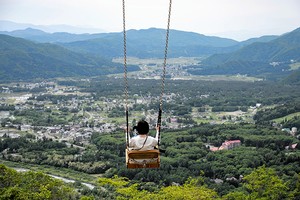By KAHO MATSUDA/ Staff Writer
October 5, 2024 at 18:31 JST
 A poster created by a labor union of a supermarket chain says customer harassment will not be tolerated. (Kaho Matsuda)
A poster created by a labor union of a supermarket chain says customer harassment will not be tolerated. (Kaho Matsuda)
Tokyo’s ordinance to protect businesses and staff in shops from abusive customers couldn’t have come soon enough as “kasu-hara” behavior seems to have become more commonplace across the sprawling metropolis.
These days, customers seem to easily get cranky, or even explode, at the slightest thing, and sometimes this leads to an altercation.
A 47-year-old man who worked as an assistant manager at a supermarket in Tokyo recalled a complaint he received from a customer: “The tofu I purchased is rotten.”
The man, eager to set things right, visited the customer’s home to check the product and found that more than two weeks had already passed since the purchase.
“Of course, the tofu would be rotten after such a long time,” he said to himself.
But he kept his thoughts to himself because he didn’t want to lose the customer.
So, he adopted a humble attitude toward the person, who then made an extraordinary request; that the man prostrate himself and apologize.
Another time, he said, a customer who was drunk physically assaulted him at the supermarket and broke his glasses.
“Until now, there was not even the concept of ‘kasu-hara,’ and I think many people were crying themselves to sleep,” he said.
A 52-year-old woman who worked at a ward office in Tokyo as a window clerk for elderly care insurance said she was once cursed by a resident who had not been certified as needing elderly care.
“Are you telling me to die?” the person shouted. “You should die!”
The woman said: “It seems to me that people feel they can say whatever they want when dealing with public servants because they are paying taxes. I wish they could understand that we employees are human beings, too.”
A survey by the labor union association UA Zensen found that 46.8 percent of service sector employees have experienced kasu-hara in the past two years.
The survey, done earlier this year, received replies from roughly 33,000 people,
In one case, an individual was forced to apologize for more than two hours outdoors in winter. In another case, a customer threw a credit card at a worker and shouted, “Who the hell do you think you are?”
Despite the gravity of these cases, the people who were abused had no means of address. Until now, there was no legal edict that defined customer harassment or measures businesses can take to prevent it.
Tokyo rushed to put the ordinance in place ahead of the rest of the country to set an example.
Labor unions have been pushing local governments to take a stronger stand against harassment.
Last fall, the Tokyo metropolitan government gathered a group of experts to come up with ways to deal with the problem. The ordinance was enacted Oct. 4 this year.
NOT JUST TOKYO
Tokyo is not alone, though. Local governments around the country have begun to act.
Hokkaido, Saitama, and Mie prefectures are also considering enacting ordinances.
Akita Prefecture, in its guidelines based on its ordinance on diversity, specifies examples of kasu-hara and points to be considered when trying to address the issue.
Miyazaki Prefecture, Kyoto city and Okayama city are among municipalities that have adopted the practice of using first name only on staff I.D. tags.
Fukuoka Prefecture created a manual earlier this year on ways to deal with kasu-hara when it occurs at administrative offices.
The point that officials want to make is where to draw the line between a legitimate request from a customer and an act that constitutes harassment.
A legal team at Tokyo Jichi Roren, which is a labor union for public sector employees, submitted a draft ordinance to the Tokyo metropolitan assembly. After that, the union submitted a letter of opinion to the various factions of the Tokyo metropolitan assembly, as well as the Tokyo metropolitan government, requesting in-depth discussion on the issue.
The legal team said that the union will not tolerate customer harassment, but also pointed out that the definition of customer harassment under the ordinance remains vague.
Since the ordinance covers public figures such as governors and assembly members, the legal team called for a more careful discussion because “legitimate opinions and political demands could be considered harassment.”
The metropolitan government is also aware of these points, and the ordinance states that “care must be taken not to unreasonably infringe on the rights of customers” because legitimate opinions and complaints can contribute to business improvement.
Hiromi Ikeuchi, a professor of social psychology at Kansai University in Osaka Prefecture, agreed it is difficult to determine what constitutes harassment.
But, she said the public now has an opportunity to recognize that customer harassment is a social problem.
“It may be the first step toward protecting the service industry on a national level,” she said.
“Large companies with manpower and money to spare are able to easily handle such issues,” Ikeuchi added. “But the question is to what extent small and midsized companies can respond to the problem. It may be necessary for the government to establish a third-party organization to look at the situation.”




















A peek through the music industry’s curtain at the producers who harnessed social media to help their idols go global.
A series based on diplomatic documents declassified by Japan’s Foreign Ministry
Here is a collection of first-hand accounts by “hibakusha” atomic bomb survivors.
Cooking experts, chefs and others involved in the field of food introduce their special recipes intertwined with their paths in life.
A series about Japanese-Americans and their memories of World War II